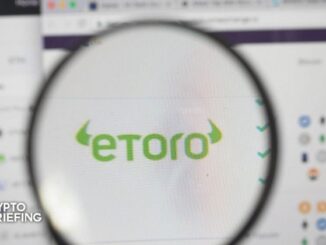
TLDR
Hong Kong’s Securities and Futures Commission (SFC) has granted approval to China Asset Management (ChinaAMC) to initiate a staking-enabled Ethereum ETF by May 15.
ChinaAMC will partner with OSL Digital Securities, utilizing their designation as an SFC-licensed digital asset platform.
OSL will furnish custody services while Kiln oversees validator nodes for the Ethereum network.
This follows a prior endorsement for Bosera International and HashKey Capital’s staking ETF, anticipated to launch on April 25.
The SFC recently issued guidance allowing licensed platforms to provide staking services as part of Hong Kong’s initiative to become a digital asset center.
Hong Kong is swiftly establishing itself as a prominent center for crypto assets in Asia through a succession of regulatory approvals that are reshaping the investment landscape. The latest advancement comes as China Asset Management (ChinaAMC) obtained approval from Hong Kong’s Securities and Futures Commission (SFC) to initiate an Ethereum ETF featuring staking capabilities.
The staking-enabled ETF, scheduled to debut by May 15, symbolizes a progressive step in Hong Kong’s advancing stance on digital assets. This sanction follows the SFC’s recent guidance released on April 7, which officially allowed licensed virtual asset trading platforms to provide staking services.
ChinaAMC’s ETF will implement staking via a collaboration with OSL Digital Securities. The alliance allows the Ethereum ETF to evolve from a passive investment vehicle into an active player within the Ethereum ecosystem, empowering investors to earn proof-of-stake rewards.
“This reduces the barriers to engaging in Ethereum staking,” stated Thomas Zhu, head of digital assets at ChinaAMC, in a statement. The arrangement renders staking more approachable for retail and institutional investors who might otherwise encounter technical challenges with direct participation.
The Technical Implementation
The technical architecture of the staking ETF encompasses numerous partners with distinct responsibilities. OSL, as the first insured and SFC-licensed digital asset platform in Hong Kong, will deliver custody services that include cold storage and insurance coverage.
Kiln, a staking platform that also supports other blockchains like Solana, Aptos, and Sui, will manage the validator nodes executing consensus functions on the Ethereum network. The firms formalized their collaboration on April 10 with the aim of bringing Ethereum staking to the market.
The implementation upholds a distinct separation of responsibilities. Kiln manages the validation components while OSL oversees the assets and administers reward distribution to investors.
According to the announcement, staking rewards generated from this arrangement will accumulate to the ETF and be incorporated into its net asset value. This structure benefits shareholders while retaining regulatory compliance.
Hong Kong’s Crypto Strategy
This endorsement is not an isolated occurrence but a segment of a broader strategy. Earlier this month, Bosera International and HashKey Capital Limited collectively launched their fund featuring a staking provision, anticipated for launch on April 25.
Hong Kong’s regulatory framework has rapidly evolved in 2025. The SFC recently revealed a comprehensive roadmap termed “ASPIRe” that delineates strategic initiatives to fortify the city’s position as a global virtual assets center.
The roadmap introduces a five-pillar structure—Access, Safeguards, Products, Infrastructure, and Relationships—focusing on key components of the digital asset ecosystem. This 12-initiative agenda seeks to promote growth by enhancing Hong Kong’s overall crypto economy framework.
During a keynote address at the Hong Kong Web3 Festival 2025, SFC Executive Director Christina Choi articulated how virtual assets could stimulate innovation in finance. The speech coincided with the announcement that licensed platforms are permitted to provide staking services.
For investors, these ETFs present multiple benefits. They enable easier access to staking rewards without necessitating technical knowledge in managing validator nodes. The ETF format also offers liquidity benefits compared to direct staking, which typically involves lock-up durations.
Institutional-grade security is another advantage, as OSL supplies cold storage and insurance coverage for the underlying assets. This addresses security issues that may deter traditional investors from direct involvement in crypto staking.
The staking rewards produced through the ETF are automatically reinvested, possibly leading to compounded growth over time. This attribute makes the product appealing for long-term investors aiming for both capital appreciation and yield.
Tax reporting may also be streamlined when compared to managing staking rewards independently, as the ETF structure offers a familiar investment vehicle with established reporting frameworks.
As more ETFs integrate staking features, Hong Kong is solidifying its position as an innovation leader in regulated crypto products. The SFC’s methodology could shape regulatory trends in other jurisdictions aspiring to balance innovation with investor protection.
These advancements arise at a time when yield-generating investments are increasingly sought after by both retail and institutional investors. By integrating staking functionalities into regulated ETFs, Hong Kong is creating novel opportunities for income generation within the digital asset sphere.
The launch of the ETF signifies a significant step towards mainstream acceptance of both Ethereum and staking. By lowering technical barriers and establishing a regulated framework, Hong Kong is enhancing the accessibility of crypto staking to a broader array of investors.








Be the first to comment